Otoko Cross: Pretty Boys Klondike Solitaire is better value than Windows Solitaire
I’m going to level with you here: Windows Solitaire is dead; long live Otoko Cross: Pretty Boys Klondike Solitaire.
In what is probably one of the most damning and depressing indictments of our modern age, in the year 2022, you have to pay for Windows Solitaire. Or rather, more specifically, you have to pay a subscription fee for Microsoft Solitaire Collection, lest you get bombarded with ads. And even when you do pay for it, you still get endless irritating messages about “rewards” you’ve earned, daily login bonuses, experience points, special events and all manner of other bullshit that really isn’t necessary for a solitaire game.
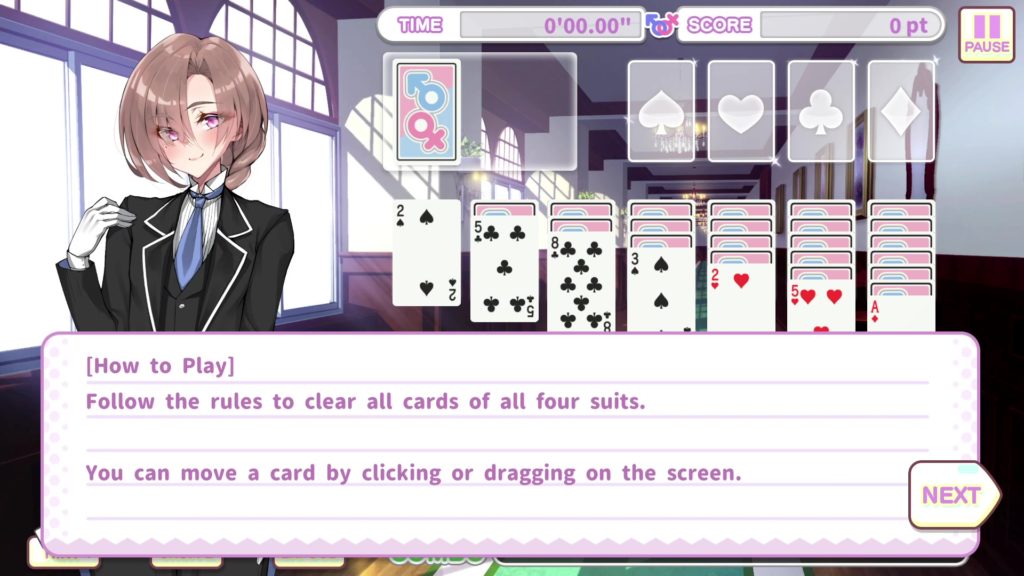
By contrast, Otoko Cross: Pretty Boys Klondike Solitaire will cost you pocket change — once, not monthly — and provide you with a simple, straightforward solitaire game that just happens to feature a selection of pretty otokonoko boys who, if you play well enough, will get their willies out for you. (For those who lack interest in willies, I would direct you to Pretty Girls Klondike Solitaire instead.)
Yes, the crossdressing-themed Otoko Cross from eastasiasoft is back after the success of its inaugural Mahjong Solitaire installment, once again offering simple but well-polished casual gameplay combined with some mild, cheeky fanservice to keep you entertained. And, much like the rest of the Otoko Cross and Pretty Girls series, this is great game to have on hand for when you’re bored but can’t really commit to anything more complicated.
Klondike Solitaire, for the unfamiliar, is the “default” form of solitaire that we used to get for free with Windows. It’s the one where you have to build the four foundation suit piles in ascending numerical order, arranging the cards to go red-black-red-black in descending order on the tableau in the meantime. It’s a game that most people probably instinctively understand at this point, though Otoko Cross: Pretty Boys Klondike Solitaire does have the decency to provide a brief tutorial the first time you play.
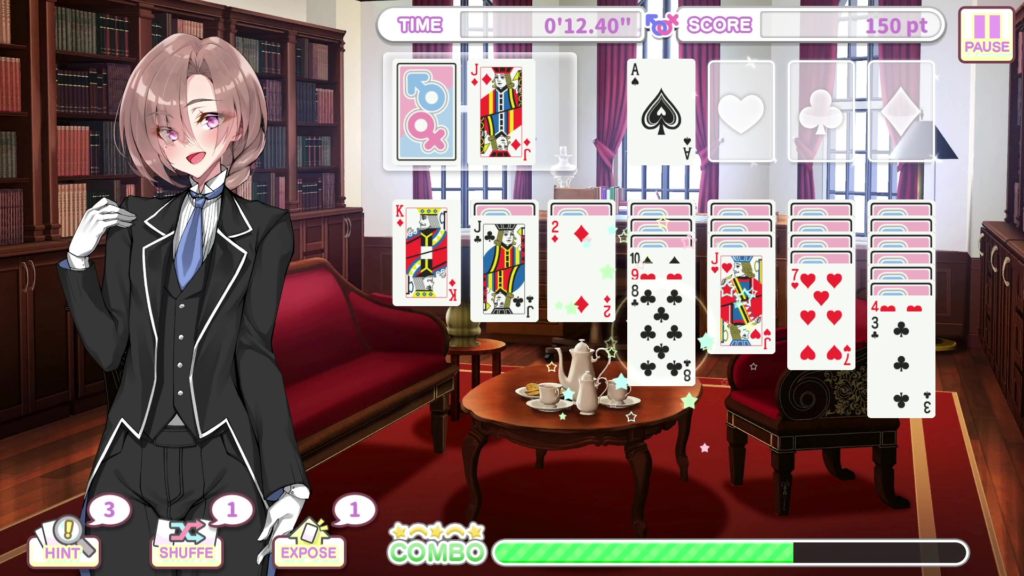
Klondike Solitaire has a few variant rules it’s possible to play by, and while you can’t fully customise these rules in Otoko Cross: Pretty Boys Klondike Solitaire, there are three difficulty levels to play at, with a new costume being unlocked for each of the game’s characters if you clear a game at each difficulty level with them selected as your “opponent”.
At the easiest difficulty level, the initial layout of the tableau appears to be deliberately rigged in your favour with lots of low numbers, allowing you to get the foundation piles started quickly and easily. You also only draw one card at a time from the deck instead of the usual three, and you have several assists available.
These assists include hints, which highlight possible moves (though not always helpful ones); shuffles (misspelled as “shuffe” in the game), which take out all the face down cards from the tableau, shuffle them together with the cards remaining in the deck and then redistribute them; and the opportunity to “expose” a face-down card from the tableau and immediately place it somewhere useful, if possible. Between the advantageous starting arrangement and the assists, you will almost certainly clear the easy difficulty most times you play.
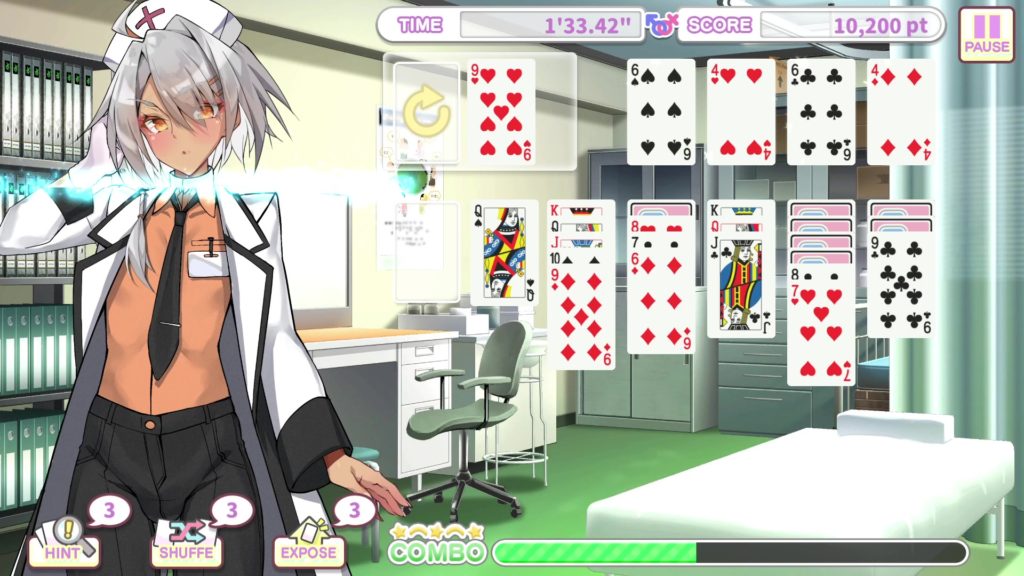
Rather than making the game feel pointless, though, this actually adds an interesting twist to the game, because there’s also a scoring system in play. The faster you move cards around, the higher the combo bonus you get — and if you can clear the deck and get the tableau into a situation where you’re guaranteed to win, an “auto” button allows you to rapidly clear all the remaining cards, scoring potentially massive points in the process.
With this in mind, Otoko Cross: Pretty Boys Klondike Solitaire takes on a somewhat arcadey feel at its lowest difficulty level, with the game being less about playing strategically and more about simply whittling through the deck as fast as possible. This is helped along by the nicely simplistic controls, which only require you to click on a card to move it to a suitable available location rather than dragging it into position. If you happen to have a touchscreen device — like, say, the Anbernic Win600 — it’s particularly enjoyable to play with a stylus or your greasy, dirty, disgusting fingers.
At the medium difficulty level, you still draw one card at a time from the deck and have assists available, but fewer of them. The starting arrangement of the tableau is also a little less likely to put you at a distinct advantage, making for a nicely balanced game that requires a little strategy (and luck) but still allows you to enjoy the arcade-style rapid play of the easiest difficulty.
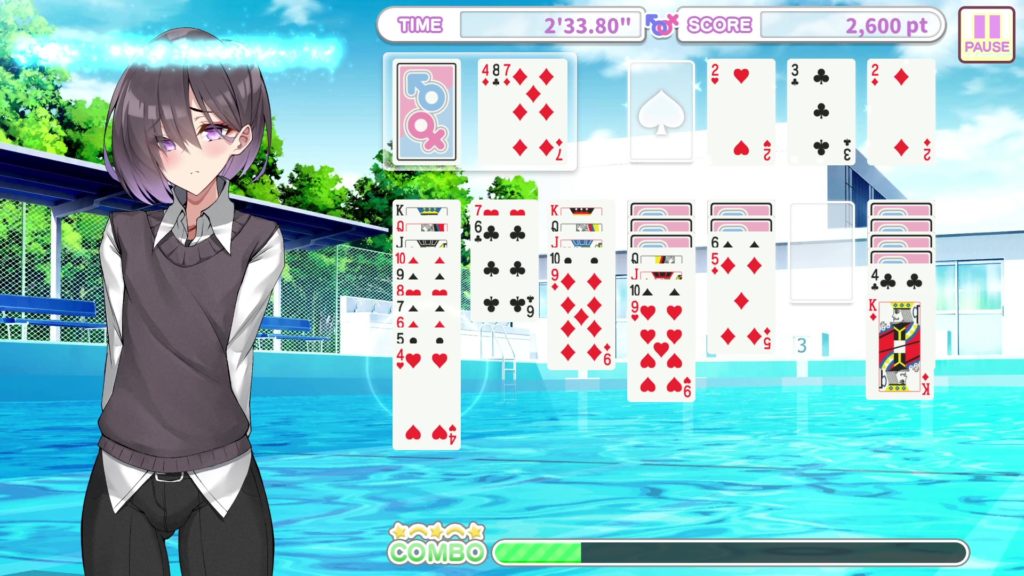
Hard mode, meanwhile, is solitaire for real men (who dress like girls). Draw three from the deck, a completely randomised tableau to begin with, no assists and an authentically low chance of success. Writing in 1979, gaming scholar and historian David Parlett noted that the popularity of Klondike solitaire “defies explanation” due to it having one of the lowest chances of winning out of any solitaire card game. This certainly seems to be the case here; expect to have to retry a few times to clear each character’s hard mode.
One thing that it perhaps would have been nice to see in the hard mode in particular is either a means of detecting when there are no more available moves to make, or simply taking the classic Windows Solitaire approach of limiting the number of times you can run through the deck. As it stands, in Hard mode of Otoko Cross: Pretty Boys Mahjong Solitaire, you have to work out for yourself whether or not you’re “stuck” and restart manually. A minor issue, to be sure, but one which could have perhaps been tweaked.
It would also have been fun to see a bit more of a middle ground between the medium and hard modes. Perhaps an option to play with assists but the draw-three rule would have been fun — or maybe even a completely custom mode, allowing you to select any combination of factors to truly customise your play: generousness of the initial tableau; number of assists; and whether you draw one or three.
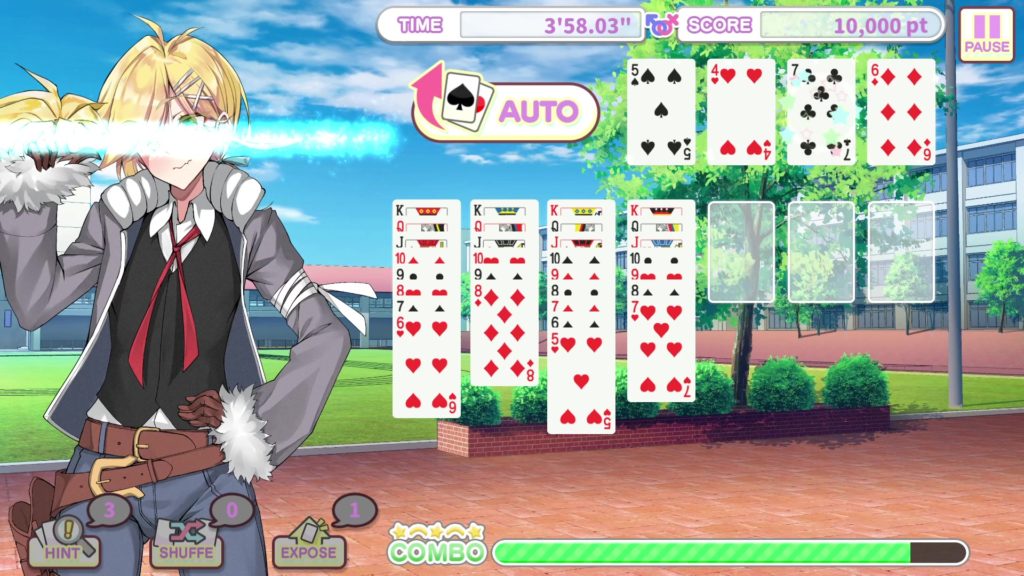
Some may level the criticism at Otoko Cross: Pretty Boys Klondike Solitaire that it lacks “longevity” or “content”. And indeed, if the only reason you’re playing this game is to unlock all the outfits and/or see naked boys who like to dress as girls, you can probably romp through the whole thing in an hour or less.
But the intention of this game is not to provide a “once and done” sort of experience. It’s Klondike Solitaire, a game which is a bit different every time you play, and always provides a fun, mild mental workout. Even once you’ve unlocked everything, Otoko Cross: Pretty Boys Klondike Solitaire provides potentially limitless replayability — no-one ever complained that Windows Solitaire “lacked content” before it started doing stupid mobile game shit, did they?
Presentation-wise, Otoko Cross: Pretty Boys Klondike Solitaire has a lot of crossover with its predecessor, with a number of the same outfits and music tracks putting in an appearance. On the one hand, it’s a shame that this title wasn’t made to feel a bit more distinct, but at the same time it’s also specifically been marketed as an alternative to Otoko Cross: Pretty Boys Mahjong Solitaire for people who found that game too complex or frustrating, rather than a “sequel” as such.
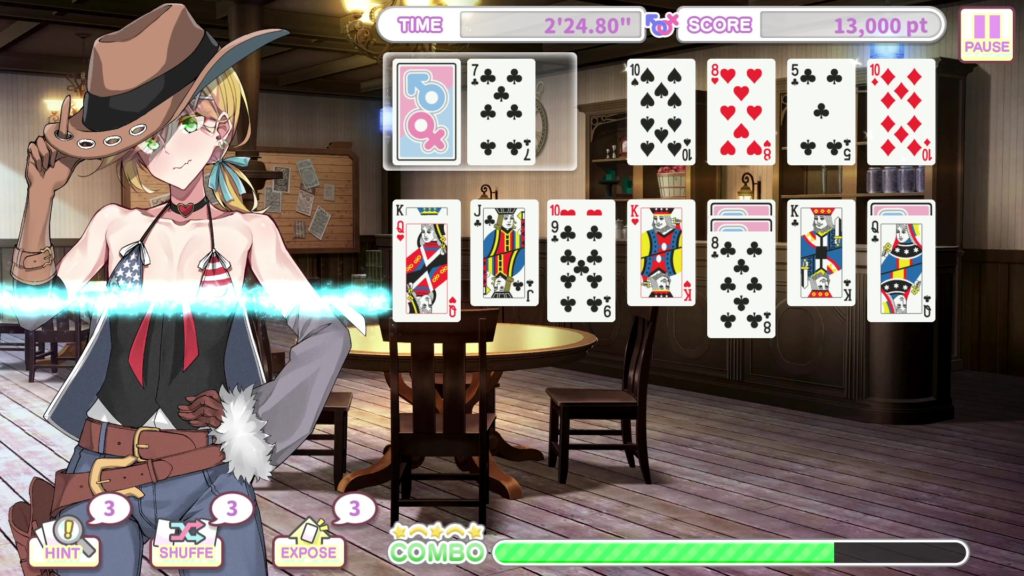
Once again, the characters are given plenty of context through a bit of biographical information you can read from the character and difficulty select screen, and this — along with the fun Japanese-language voice samples — helps you develop a sense of attachment to each Pretty Boy and their distinctive personality. As before, while the spoken language is Japanese, each of the characters have something of a distinct “quirk” about their voices such as speaking French or speaking with a strong accent; this helps them feel less generic and like they’ve really been thought about.
All in all then, Otoko Cross: Pretty Boys Klondike Solitaire does exactly what it sets out to do, and it does it well. It would be nice to see these characters incorporated into a more ambitious project at some point in the near future — but as a means of establishing them as an ensemble cast and getting people familiar with them, these casual games are doing a fine job, and I certainly wouldn’t object to seeing more.
Otoko Cross: Pretty Boys Klondike Solitaire is out now on Steam. Console versions are planned, but have no specific release information as yet. Thanks to eastasiasoft for the review code.
Join The Discussion
Rice Digital Discord
Rice Digital Twitter
Rice Digital Facebook
Or write us a letter for the Rice Digital Friday Letters Page by clicking here!
Disclosure: Some links in this article may be affiliate links, which means we may earn a small commission if you make a purchase after clicking on them. This is at no additional cost to you and helps support Rice Digital!
- Letter from the Editor: passing the torch - June 30, 2023
- Super Woden GP 2 is looking promising - June 30, 2023
- Inti Creates is making a 32 bit-style Love Live action platformer - June 26, 2023







